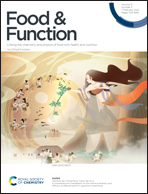Water extract of Ferula lehmanni Boiss. prevents high-fat diet-induced overweight and liver injury by modulating the intestinal microbiota in mice†
Abstract
Obesity, often accompanied by hepatic steatosis, has been associated with an increased risk of health complications such as fatty liver disease and certain cancers. Ferula lehmannii Boiss., a food and medicine homologue, has been used for centuries as a seasoning showing anti-bacterial and anti-oxidant effects on digestive discomfort. In the present study, we sought to investigate whether a short-term oral administration of water extract of Ferula lehmanni Boiss. (WEFL) could prevent high-fat diet (HFD)-induced abnormal weight gain and hepatic steatosis in mice and its underlying mechanisms. WEFL reduced HFD-increased body weight, liver injury markers and inflammatory cytokines (i.e. IL-6 and IL-1β), and inhibited the elevation of AMPKα, SREBP-1c and FAS in HFD. Moreover, WEFL reconstructed the gut microbiota composition by increasing the relative abundances of beneficial bacteria, e.g. Akkermansia spp., while decreasing Desulfovibrio spp. and so on, thereby reversing the detrimental effects of HFD in mice. Removal of the gut microbiota with antibiotics partially eliminated the hepatoprotective effects of WEFL. Notably, WEFL substantially promoted the levels of short-chain fatty acids, especially butyric acid. To clarify the functional components at play in WEFL, we used UPLC-MS/MS to comprehensively detect its substance composition and found it to be a collection of polyphenol-rich compounds. Together, our findings demonstrate that WEFL prevented HFD-induced obesity and liver injury through the hepatic-microbiota axis, and such health-promoting value might be explained by the enriched abundant polyphenols.



 Please wait while we load your content...
Please wait while we load your content...